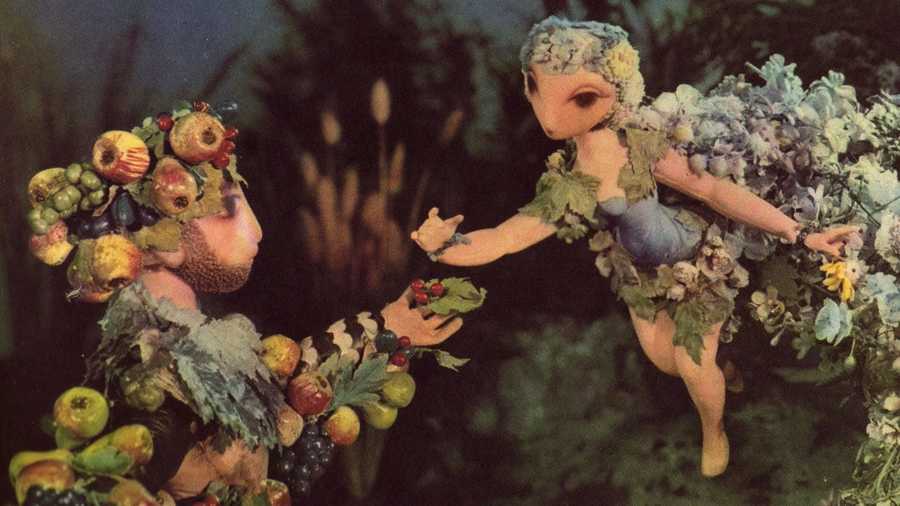
“Jiri Trnka didn’t craft his puppet-cartoon shorts and features merely to imitate life,” writes Michael Sragow for Film Comment. “His endlessly original and inventive movies incorporate life, or transcend it. Trnka insisted that he was ‘local,’ and drew many of his subjects from Czech folk culture. But his sophistication energized his work, even as his warmth and freshness gave it emotional appeal. Best of all, he had ‘vision’ in the primal sense—a new way of seeing.”
“In a remarkable stretch between 1947 and his death in 1969, Trnka proudly preserved Czech folklore and adapted Shakespeare and Chekhov in reverent, lovely tones, but also satirized the Nazi occupation, Hollywood Westerns and his own Communist government’s heavy hands,” writes Patrick Dahl for Screen Slate. “His sharp wit and eye for absurdist gags will be on full display at Film Society of Lincoln Center this week, as each of Trnka’s six features and eighteen shorts arrive as part of a comprehensive retrospective produced by the Comeback Company. Not a single screening should be missed.”
The Puppet Master: The Complete Jiri Trnka opens today and runs through Wednesday and, on the new Close-Up podcast (34’59”), FSLC editorial director Michael Koresky discusses the series with programmers Florence Almozini and Irena Kovarova.
After it leaves New York, the series will head to the Cinematheque at the Cleveland Institute of Art (may 12 through June 9), the American Cinematheque in Los Angeles (May 31 through June 3), the Eastman Museum in Rochester, and Cinémathèque québécoise in Montreal (September 12 through 18).
MORE GOINGS ON
New York. Radical Presence: Anne Wiazemsky opens today at the Quad and runs through Thursday. “Beyond canonical Godard titles like La Chinoise [1967] and Weekend [1967], the Quad is showing Sympathy for the Devil [1968], which, in addition to Ms. Wiazemsky, features the Rolling Stones, shown working methodically and repetitively in a recording studio,” notes Ben Kenigsberg in the New York Times.
“Although the cinema of Mahamat-Saleh Haroun is far less well-known in America than it should be, the Chadian filmmaker is one of the major contemporary filmmakers of the past two decades, crafting a remarkable body of absorbing, experimental, and politically resonant work,” writes BAMcinématek programmer Ashley Clark. Mahamat-Saleh Haroun: Modern Griot opens today and runs through Wednesday.
On Sunday, the Museum of the Moving Image’s Fashion in Film Festival – Wearing Time: Past, Present, Future, Dream features John Coney’s Space Is the Place (1974) starring Sun Ra and Jindřich Polák’s Voyage to the End of the Universe (Ikarie XB-1) (1963). “The design of Ikarie’s hallways and spacesuits might tip you off to the fact that Stanley Kubrick watched this movie over and over while preparing for 2001,” writes Chloe Lizotte at Screen Slate. “Both films feature crucial video call scenes, and though they might look similar on the surface, the tenderness of Polák’s close-ups sets them in totally different emotional registers.” The festival wraps with Andrei Tarkovsky’s answer to 2001, Solaris (1972).
The new 4K restoration of Henri-Georges Clouzot’s Le Corbeau (1943) runs from today through May 1 at Film Forum. “It was denounced by the Catholic Church,” notes Anthony Lane in the New Yorker, “and banned after the Liberation; Clouzot had shown, with mortifying clarity, how ordinary people could behave when given the chance to finger their fellow-citizens—and, in the process, to assuage their own lurking shame. His most fêted works, The Wages of Fear (1953) and Les Diaboliques (1955), lay in the future, but his loveless commandment was already carved in stone: Thou shalt hate thy neighbor as thyself.”
Los Angeles. On Monday, REDCAT presents Chantal?, a performance by cello player Sonia Wieder-Atherton based on Chantal Akerman's work.
Chicago. “In this year’s eclectic Chicago Palestine Film Festival, two themes dominate: the tension between tradition and modernity, and the uneasy, often tragic relations between Palestinians and Israelis.” For the Reader, Andrea Gronvall writes about Annemarie Jacir’s Wajib, Rashid Masharawi’s Writing on Snow, Stephen Apkon and Andrew Young’s Disturbing the Peace, and Erika Cohn’s The Judge. The festival opens tomorrow and runs through May 3 at the Gene Siskel Film Center.
Austin. Todd Haynes’s first feature, Poison (1991), screens on Tuesday at the AFS Cinema.
London. With the BFI’s Sergio Leone season running through the end of the month, Christina Newland argues that, in Once Upon a Time in the West (1968), Claudia Cardinale’s Jill McBain “is the overruling force at the centre of the narrative, not so much the sole driver of plot but one whose appraisal of the actions of the violent men around her matter deeply to the narrative.”
Grant Gee will be at the London Review Bookshop on Monday to present Patience (After Sebald) (2012).
Paris. Selected works by Agnès Varda are on view at Galerie Nathalie Obadia through May 31, including Une Cabane de cinéma: La serre du Bonheur, a shack incorporating a 35 mm print of Varda’s 1965 film, Le bonheur—and sunflowers.
Limassol, Cyprus. Abel Ferrera will deliver a masterclass on Wednesday as part of the sixteenth Cyprus Days International Film Festival, currently running through April 28.
For news and items of interest throughout the day, every day, follow @CriterionDaily.
from The Criterion Current https://ift.tt/2HMXvwn
Nessun commento:
Posta un commento